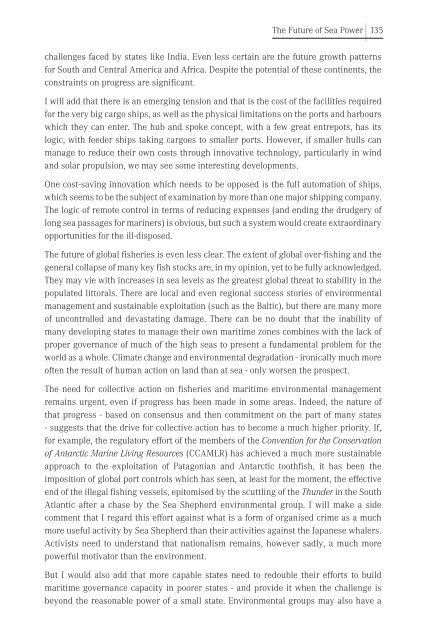THE FUTURE OF SEA POWER
SPC2015_Proceedings
SPC2015_Proceedings
Create successful ePaper yourself
Turn your PDF publications into a flip-book with our unique Google optimized e-Paper software.
The Future of Sea Power |<br />
135<br />
challenges faced by states like India. Even less certain are the future growth patterns<br />
for South and Central America and Africa. Despite the potential of these continents, the<br />
constraints on progress are significant.<br />
I will add that there is an emerging tension and that is the cost of the facilities required<br />
for the very big cargo ships, as well as the physical limitations on the ports and harbours<br />
which they can enter. The hub and spoke concept, with a few great entrepots, has its<br />
logic, with feeder ships taking cargoes to smaller ports. However, if smaller hulls can<br />
manage to reduce their own costs through innovative technology, particularly in wind<br />
and solar propulsion, we may see some interesting developments.<br />
One cost-saving innovation which needs to be opposed is the full automation of ships,<br />
which seems to be the subject of examination by more than one major shipping company.<br />
The logic of remote control in terms of reducing expenses (and ending the drudgery of<br />
long sea passages for mariners) is obvious, but such a system would create extraordinary<br />
opportunities for the ill-disposed.<br />
The future of global fisheries is even less clear. The extent of global over-fishing and the<br />
general collapse of many key fish stocks are, in my opinion, yet to be fully acknowledged.<br />
They may vie with increases in sea levels as the greatest global threat to stability in the<br />
populated littorals. There are local and even regional success stories of environmental<br />
management and sustainable exploitation (such as the Baltic), but there are many more<br />
of uncontrolled and devastating damage. There can be no doubt that the inability of<br />
many developing states to manage their own maritime zones combines with the lack of<br />
proper governance of much of the high seas to present a fundamental problem for the<br />
world as a whole. Climate change and environmental degradation - ironically much more<br />
often the result of human action on land than at sea - only worsen the prospect.<br />
The need for collective action on fisheries and maritime environmental management<br />
remains urgent, even if progress has been made in some areas. Indeed, the nature of<br />
that progress - based on consensus and then commitment on the part of many states<br />
- suggests that the drive for collective action has to become a much higher priority. If,<br />
for example, the regulatory effort of the members of the Convention for the Conservation<br />
of Antarctic Marine Living Resources (CCAMLR) has achieved a much more sustainable<br />
approach to the exploitation of Patagonian and Antarctic toothfish, it has been the<br />
imposition of global port controls which has seen, at least for the moment, the effective<br />
end of the illegal fishing vessels, epitomised by the scuttling of the Thunder in the South<br />
Atlantic after a chase by the Sea Shepherd environmental group. I will make a side<br />
comment that I regard this effort against what is a form of organised crime as a much<br />
more useful activity by Sea Shepherd than their activities against the Japanese whalers.<br />
Activists need to understand that nationalism remains, however sadly, a much more<br />
powerful motivator than the environment.<br />
But I would also add that more capable states need to redouble their efforts to build<br />
maritime governance capacity in poorer states - and provide it when the challenge is<br />
beyond the reasonable power of a small state. Environmental groups may also have a


